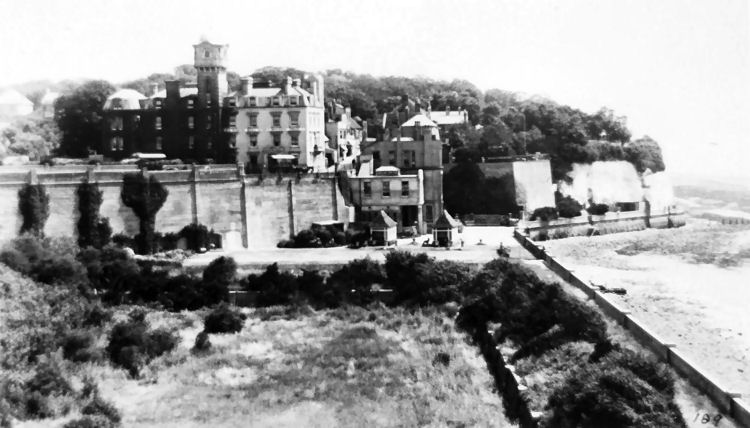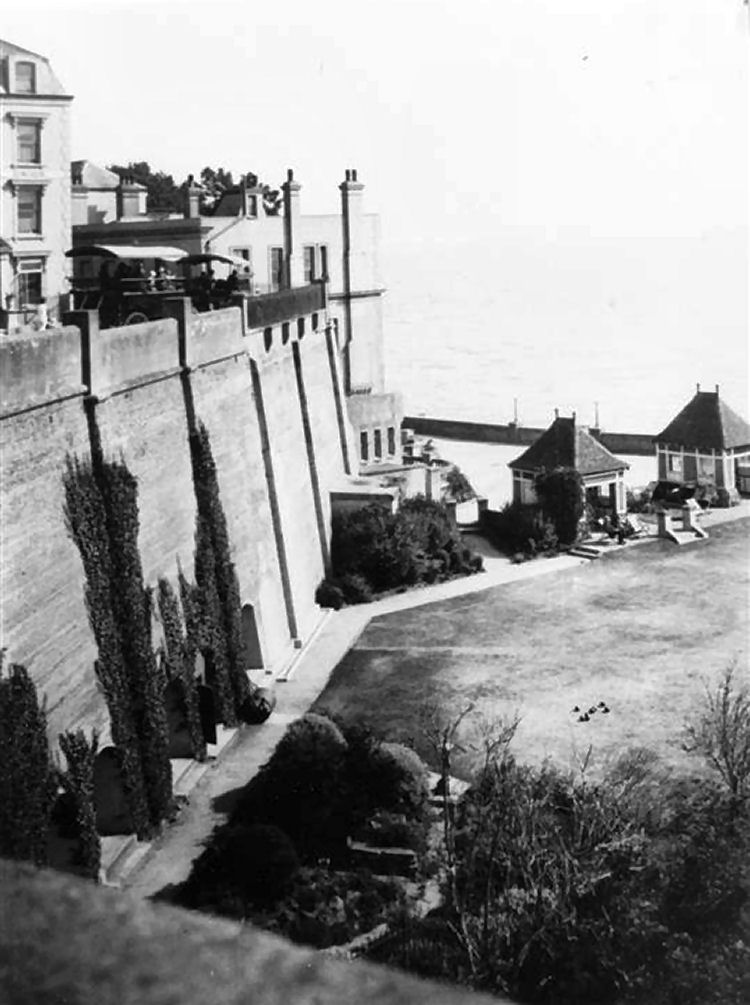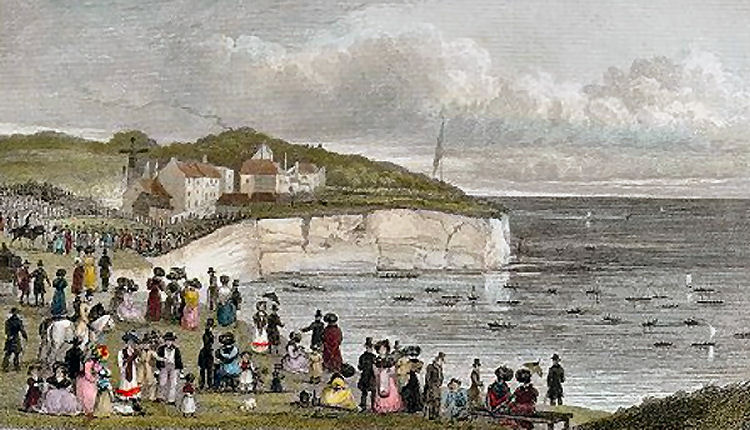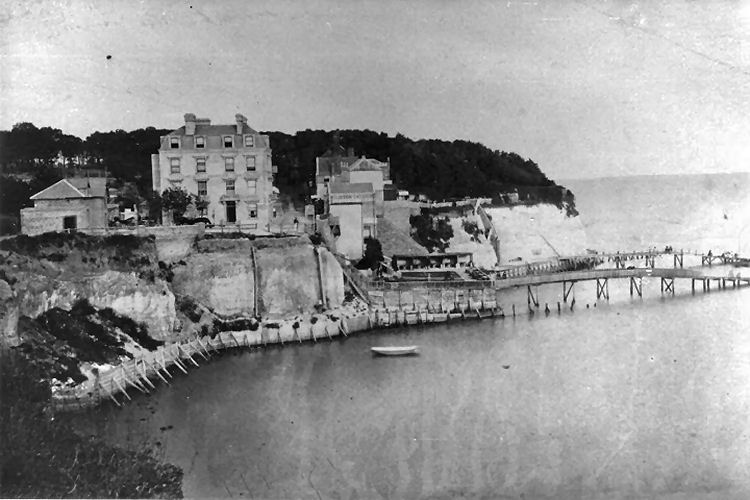|
Pegwell Road
Pegwell Bay

Above photo 1920, showing the area where the "Conyngham" used to stand. |

Above photo circa 1920, showing the bowling green. |
This pub has been found by author and historian Michael David Mirams who
says of it the following:- The premises opened as a Cafe and Restaurant in
1875 and included a swimming pool and short pier amongst its attractions.
The proprietor also had a pet alligator. Unfortunately the building was
demolished in 1906 as trade wasn't good enough to keep it going, and the
area was replaced with a bowling green.
Also known as the Conyngham Hotel.
|
From the Kentish Gazette, 15 April, 1856.
RAMSGATE, TO BE SOLD BY PRIVATE TREATY.
“CONYNGHAM HOUSE,” PREMISES AND LAND.
Comprising a commodious and gentlemanly Family Residence. Containing ten
bed rooms, two dressing rooms, dining and drawing rooms, breakfast
parlour, study, store rooms, pantry, laundry, good offices, and excellent
cellarage; coach house and stabling, pleasure and kitchen gardens.
The above is a Compact and Substantial House, situated in one of the
most healthy and pleasant parts of Ramsgate.
Immediate Possession can be had.
For cards to view, after the 19th of March, apply to Friend and Vinten,
Auctioneers and Estate Agents, “The Cabinet Warehouse,” Ramsgate.
|
|
From the Thanet Advertiser, 7 July, 1894.
IMPROVEMENTS AT PEGWELL.
The quiet-going little hamlet of Pegwell, after a long period of
competitive somnolence, seems to be awakening to the needs of these
progressive times. In the vicinity of the locality famed for its shrimps
and its tea-parties (and more latterly for badgers), private enterprise
has been doing much to bring Pegwell up to date. We have been able once
or twice during the last twelve months to record generous gifts to the
public of land belonging to private owners, the donors including Mr. R.
Bear, Mr. Banger, and Mr. J. Passmore Edwards, of the Echo. Since that
time the prosperity of the picturesque hamlet has received a distinct
fillip, and many Pegwellians, with a courage and optimism which does
them credit, are prophesying great things for the pleasant little spot.
Foremost amongst the endeavours made is the generous effort of Mr.
Passmore Edwards, who has purchased the building formerly known as "Tatnell’s
Hotel," and, with characteristic generosity placed it at the disposal of
the Working Men's Club and Institute Union, London. Mr. Passmore
Edwards's idea is this: that there are a large number of London artisans
and other members of clubs and institutes in the metropolis who, run
down by overwork and long hours in the great city, need an occasional
indulgence in the relaxations which the sea-side pre-eminently affords.
So, at considerable cost, he has purchased the "Pegwell hotel," had it
fitted with great completeness from top to bottom, and has and has
handed it over to the Club and Institute Union, whose endeavour it will
be to make it an attractive sea-side resort for members of associated
clubs. Mr. Passmore Edwards has provided all that is necessary in the
way of decorating, repairing, and fitting the thirty odd rooms in the
commodious building. The Club und Institute Union are to provide the
furniture, and the Club and Institute Union not being endowed, any more
than the rest of us, with superfluous funds, are asking clubmen and
other generous people to help them in the endeavour to suitably furnish
the place. Several London clubs have promptly responded to the Uuion's
appeal, and the members of the Ramsgate Liberal Club are making an
effort to endow one or two rooms. Several prominent gentlemen have
handed over their subscriptions, and it is hoped and expected that the
balance will be forthcoming without long delay. It would be a poor
return for Mr. Passmore Edwards's generosity if the Convalescent Home
had to start its career in nakedness. All who have had anything to do
with furnishing houses know what it means to adequately fit up
apartments in a comfortable style. Modestly enough the Union appear to
have put down £5 per room as the estimate. It will thus be seen that
there will be little Oriental magnificence about the home’s
appointments; the aim of the kindly donor, and of the Union is to
provide a place where the jaded and weary Londoner can enjoy himself
for a few weeks in the summer and bring back to his cheeks the colour of
health. Who would not help in such a cause us this? The Thanet
Advertiser reporter who went down to view the place a day or two ago was
charmed with the arrangements made. Everything is in apple-pie order,
and the project taken all round seems to be an admirable one. He was
informed that the subscribers towards the fond for endowing the
"Ramsgate Room" included the ever-ready Mayor of Ramsgate, Sir William
H. Wills. Bart, Messrs. W. Carling, M. J. Poole, G. Vye, A. T. Richford,
E. E. Wastall, and other popular local friends of the workers. The idea
is such a capital one that there is no room to doubt the ultimate
success of the scheme.
In addition to the Convalescent Rome, Pegwell is having improvements of
another kind. The gardens below the cliff, where in his younger days our
representative spent many delightful and inexpensive hours contemplating
the scenery and the stars, etcetera, have been, so to speak,
rejuvenated, and they begin to look gay in their new attire. In a few
days it is hoped the transformation scene will be complete, and Pegwell-by-the-Sea
will be beautiful again. Mr. G. Scamp, of Ramsgate, is the builder of
the new venture. It will include handsome and spacious dining rooms, a
tennis ground, shady bowers where people can eat shrimps and drink tea,
a large room for beanfeast and dinner parties, a lake for skating in
winter, and lots of other attractive features, much too numerous to
mention. Mr. Scamp is also engaged in repairing the remains of the
picturesque little pier, which was ruined in a furious gale some years
since. It is now being so renovated as to afford an easy landing place
for small boats. Under the cliff there will be a capital road for
promenading, and means are being furnished whereby a descent can be
easily made from the summit to the cool shade of the “ground floor.” Our
man looked in rain for artificial rock work. The enterprising
proprietor, however, believe in taking Nature as he finds her, and, as
a consequence, no monstrosities of that character are on view. Some day,
when Pegwell-by-the-Sea becomes a thriving borough, and its inhabitants
get old and childish, the imitation rockery may be there. Up to the
present the promoters of the "Conyngham" restaurants and pleasure
grounds rely largely upon Nature’s aid for the beautification of this
pleasing little spot. Mr. Scamp very nearly let our representative into
a secret. It appears that he has discovered, somewhere, a stream of pure
water, and a well, full of Apollinaris, or Zoedone, or Glencoe, or some
equally pleasant liquid. Now, it isn’t generally known, but eminent
antiquarians say it is a fact that Pegwell was so called because a well
existed there. Where the "peg" comes in is not so certain. At all events
the well has been discovered and the oldest inhabitants of the hamlet
are at this moment telling one another stories about a certain worthy
gentleman named Augustine, who
was in business in the saint line, and who used to come down to Pegwell
with his family every summer to eat shrimps and take the waters of this
wonderful well. Several gentlemen visitors were taking the waters during
the visit of our reporter, and he noticed with pleasure the invigorating
effects of the medicinal precaution. Jesting aside, there will be
something to see this year at Pegwell if the present weather holds out
and the visitors hold on. Certainly the enterprise is one of some
magnitude, and one cannot help wishing the sanguine promoters all the
success they deserve and expect. Those who knew Pegwell in the old days
will rejoice at its reawakening. It is a very pretty little spot, easy
of access from the town, and it promises to provide more than one
valuable addition to the many attractions of the borough.
It has been arranged that the "Conyngham Restaurant and Cafe" shall be
opened next Wednesday.
|
|
From the Thanet Advertiser, 22 September, 1894.
REGATTA AT PEGWELL BAY.

St. Augustine would have been considerably astonished had he re-visited
Pegwell Bay on Tuesday to find the picturesque hamlet in its best
holiday attire, with visitors as numerous as shrimps on the sea shore.
Pegwell does not have a regatta often. It used to in the old days, but
some time ago the inhabitants abandoned the event and went to sleep,
like Rip van Winkle. Also like that amiable Dutchman they subsequently
woke up, and this year, as becomes a branch of a healthy parent stem
like Ramsgate, Pegwell has endeavoured to make itself famous by holding
a regatta entirely "on its own." And, despite the not unexpected
difficulty about funds, a very pleasant and successful little affair it
was. Hundreds of visitors flocked to the scene during the day, and, the
weather being splendid, watched in comfort and with apparent interest
the progress of a good programme of events. The pretty grounds of the "Conyngham
Cafe," of which Mr. G. Scamp is the proprietor, and the bijou pier
adjoining, were utilised for the occasion, and the regatta offered in
one material respect a considerable advantage over other fetes of the
sort. Everyone could see what was going on, and everyone seemed to enter
readily into the spirit of the affair. At many regattas the interest is
limited to the favoured individuals who happen to be aboard the lugger
which serves as a committee boat. It should be mentioned that the
gentlemen who most assisted in making the arrangements for the gala were
Messrs. S. Banger, sen., A. Downs, G. Scamp, H. R. Armitage, R. Grant,
S. Banger, jun., W. Fife, G. Hills, and G. Moulder; while Mr. J. Simson
very efficiently discharged the by no means light duties of hon. sec.
The evening’s illuminations, as well as the decorations, were wisely
entrusted to Messrs. Assiter and Andrews, who repeated, on a more
limited scale, their notable successes at Ramsgate regatta. Naturally
the illuminations were an attractive feature of the proceedings, and
came in for a good deal of favourable comment. For the races, Mr. H. R,
Armitage acted as starter, Mr. R. Grant as umpire, and Mr. Simson dealt
very diplomatically with the competitor—always in evidence at
regattas—who hasn't won a prize and won't be happy till he gets one. In
the evening there was to have been an illuminated cycle parade. Owing to
some reluctance on the part of local cyclists to immortalise themselves
by becoming parts of a public pageant, the procession was on a very
limited scale. It included, however, one or two very prettily decorated
cycles, that ridden by a small maiden, seated demurely under an
umbrella, from which depended numerous coloured lanterns, being the most
attractive feature. Prizes for the best illuminated cycles were given by
Mr. S. Priestley, High-street, and Mr. Martin, Queen-street. During the
afternoon and evening Mr. A. J. Webb's excellent Town and Artillery Band
discoursed sweet music in the grounds of the restaurant. The results of
the chief contests were as follows:—
Pair-oared race in wherries, open to Pegwell, Chilton, and St Lawrence;
prizes, clock given by Mr. J. J. Blackburn, £1, aud 10s.:—1, Bow Bella
(S. Banger, jun., and Milton); 2, Wallflower (Ambrose and Hinge); 3,
Lizzie (Redmond and King.)
Boatmen's race in wherries, with coxswains; prizes £2, £1, and 10s.:—1,
Bow Bells (Kirkcaldie and Cullen); 2, Lizzie (Miller aud Stead); 3,
Unknown (Cooper and Fox.)
Youths' swimming race, for cup presented by Mr. J. Simson. and 7s. 6d.
for second prize:— 1, F. Sutton ; 2, Goldfinch; 3, G. Lush.
Pair-oared race in wherries, for Volunteers, Firemen, and Ambulance
Corps. Prizes, first, given by the Mayor of Ramsgate; second, £1; third,
10s.:—1, Bow Bells (Tucker and Crale); 2, Lizzie (W. and W. A. Brett);
3, Caroline (G. Read and W. Fagg.)
Barrow race, for prizes, first given by Mr. C. Buckley, second by Mr. G.
Foreman, third by Mr. S. Banger, jun. 1, March; 2, Clarke; 3, Redmond.
Obstacle race; prizes 10s., 5s., and 2s. 6d.:— 1, J. March; 2, Liddle;
3, Fox.
Shrimpers' race ; prizes 10s., 7s. 6d., 5b., and 2s. 6d.:—1, Goldfinch;
2, Craycraft; 3, H. Gisbey.
Special barrow race; prizes, first, silver watch, second, 5s. 1, G. Fox;
2, Drury.
There were also the usual greasy pole contest, which excited the
accustomed amount of fun, and numerous other sports were provided in the
grounds. The prizes were distributed on Wednesday evening at the
"Chiltern Tavern," the ceremony being performed by Mr. S. Banger, sen.,
the chairman of the committee.
|
|
From the Thanet Advertiser, 1 August, 1896.
WANTED.
A waiter and a waitress.
Apply "Conyngham Cafe," Pegwell Bay.
|
|
Following text taken from ????.
The picture from the Pegwell regatta shows a large bay where today
much of it has been reclaimed. This article from the National Piers
Society shows the why.
"Britain’s shortest-lived pleasure pier at just five years was
conceived as part of the Ravenscliff Gardens development by the Pegwell
Bay Aquarium and Hotel Company. The Company was formed by James Tatnell,
who owned the Clifton Hotel in the village, in 1872 to reclaim six acres
of foreshore for the gardens. The aquarium part of the scheme was later
dropped, but the Clifton Hotel was enlarged, and in addition to the
pier, the gardens were also to house a swimming pool, restaurant,
skating rink and photographic studio.
An application was forwarded to the Board of Trade in June 1874 and
work began on reclaiming the cove the following year. On 16th September
1879 the Ravenscliff Gardens and Pier were formally opened and a basic
entrance fee of 2d was charged to use the gardens and pier, although
this was increased to up to 6d for special occasions such as regattas.

The pier was a rather fragile structure, 300ft in length, constructed
of wood with slender iron supporting columns. A kiosk was placed on the
pier head, which also had two small landing stages. However, no evidence
has come to light that any vessels ever called there and the gardens and
pier were a colossal failure; leading to the failure of the Pegwell Bay
Aquarium and Hotel Company within a year of opening. The Clifton Hotel and Ravenscliff Gardens and Pier passed to the
mortgage company (the Sheffield & South Yorkshire Building Society) who
leased them in 1880 to John Garratt Elliott, who, as a member of the
London Swimming Club, was principally interested in the swimming pool.
However he departed in the following year and the mortgage company tried
unsuccessfully to sell the development. It appears that in 1883-4 the
gardens and pier were leased to Jane Carter at the Belle Vue Tavern
(famous for its shrimp paste), but the short and rather sad life of the
little pier came to an end on 4th December 1884 when the hull of the
wrecked barge Usko drove through the shore end of the structure during a
gale. In January and February 1885 the surviving portion of the pier was
sold off upon the cliff top. The gardens eventually came into the hands of the Working Men’s Club &
Institute Union, which had utilised the former Clifton Hotel since
August 1894. A corner was also used by the Conyngham Café for various
entertainments between the years 1894-1908. The swimming pool was filled
in in 1895 and the gardens steadily over the years became unkempt. They
were abandoned by the convalescent home in the late 1960s and are now
very overgrown. However, at low tide, the piles of the head of the
long-lost pier may still be seen. A booklet by Martin Easdown about this Kentish resort and its failed
attempts to become a watering place to rival neighbouring Ramsgate is
available via the NPS Shop webpage. The booklet has a particular
emphasis on the development and decline of the Ravenscliff Gardens and
Pier during the period 1872 to 1908." |
|
Thanet Advertiser 29 September 1900.
APPLICATION' FOR A FULL LICENCE FOR THE CONYNGHAM CAFE.
Mr. George
Charles Scamp, of the "Conyngham Restaurant," Pegwell, applied for a
licence to sell spirits.
Mr. A. H. Daniel supported the application,
which was opposed by Mr. H. Bracher (for the temperance party), and Mr.
J. W. Weigall (for the owner and tenant of the "Belle Vue Hotel").
Mr.
Daniel stated that Mr. Scamp had been tenant of the premises in question
for the last five or six years, holding them on a lease which expired in
1915, at an annual rental of £120.
About four or five years ago Mr.
Scamp obtained from their worships a licence to sell wines and beer, and
although he had found that licence a great boon and of very great
service to him in carrying on his business, he found it absolutely
impossible to comply with the urgent and perfectly legitimate demands of
his customers without that further concession he was asking at their
worships’ hands that day.
Mr. Scamp, in addition to the ordinary
business of a restaurant keeper, also carried a considerable business as
a hotel proprietor or boarding-house keeper. The premises contained
twelve bedrooms, which were capable of providing sleeping accommodation
for upwards of thirty persons. In addition he had a number of boarders
for whom he provided sleeping accommodation elsewhere.
Pegwell, added
Mr. Daniel, was a most favoured resort of visitors to this
neighbourhood. There was hardly a single visitor to Ramsgate or the Isle
of Thanet who did not find himself some time or other at Pegwell Bay,
which was famous not only for its beautiful air and surroundings, but
was also famous for shrimps, whether potted or unpotted.
If Pegwell Bay
was an attractive spot the "Conyngham" restaurant was the most
attractive feature in that locality, having spacious dining-rooms and
gardens extending out to the seashore. Mr. Scamp had supplied him with
statistics which shewed that during the month of August alone there were
over 2,100 dinners served in the house. Among such a large number of
persons there must necessarily be a large demand for spirits, more
especially when they considered the fact that whiskey was far
superseding beer as the national beverage of the country. Then, again,
they all knew that amongst the most numerous supporters of Mr. Scamp
were those persons travelling in the many brakes and waggonettes
standing all the way from the "Conyngham Restaurant" right up the
Pegwell-road in the direction of Ramsgate.
In order to show that the
application was made to supply a great public demand he would be able to
put in a letter written by the secretary of the brake association in
which he urgently asked Mr. Scamp to apply for the licence, because
there were loud and frequent complaints by people travelling in the wagonettes and brakes that they could not obtain spirits at the "Conynghnm
Restaurant." He had also a memorial signed by over 800 persons, and one
from the brake drivers and proprietors numbering 66 signatures. He
ventured to think there never was a stronger case presented to their
worships.
Mr. George Charles Scamp, the applicant, bore out the opening
statement, adding that he had as many as 70 persons taking meals at his
house daily during the season. There was a considerable demand for
spirits, and surprise had often been expressed by visitors that he could
not supply them with each. He witnessed every signature appended to the
memorial. A large number of brakes stopped outside his house and he had
frequently to send out for spirits.
By the Magistrates’ Clerk:- The
rateable value of the premises was £48 per year.
Applicant was
cross-examined at some length by Mr. Weigall with the view of shewing
that the "Belle Vue Hotel" met all present.
|
LICENSEE LIST
SCAMP George Charles 1895-03+
|



